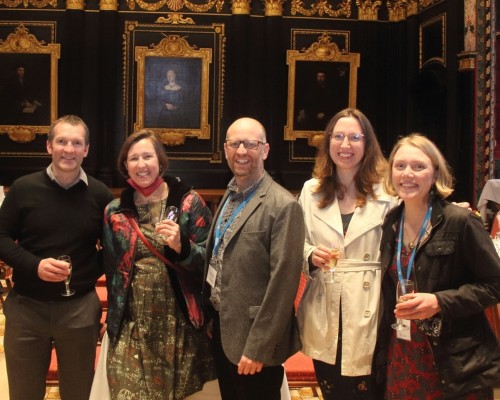10 November 2022
University of Bristol academics, Drs Ellen Brooks Pollock OBE, Leon Danon, Robert Challen, Amy Thomas and Emily Nixon have been recognised for their epidemiological modelling work supporting the UK government’s response to the coronavirus pandemic.

Drs Ellen Brooks Pollock OBE, Leon Danon and Robert Challen, have been awarded the prestigious Weldon Memorial Prize along with other members of the SPI-M-O group, which reports to the Scientific Advisory Group for Emergencies (SAGE).
Additionally, Drs Leon Danon, Robert Challen, Amy Thomas and Emily Nixon were awarded the SPI-M-O (Scientific Pandemic Influenza Group on Modelling group) Award for Modelling and Data Support (SAMDS) which recognises those who have made an exceptional contribution to the work of the group outside of their usual work activity.
The Weldon Memorial Prize is awarded annually by the University of Oxford for ‘noteworthy contributions in the development of mathematical or statistical methods applied to problems in biology’. This is the first time in its history that the prize, which has been awarded since 1911, has been given to a group rather than an individual.
Under great pressure to deliver results quickly, and under immense public scrutiny, the group built on existing science and developed new epidemiological and statistical techniques to understand the spread of the virus and how it might be controlled.
Dr Ellen Brooks-Pollock, on behalf of the Bristol research team, said: “It was a privilege to be part of the COVID response in the UK. We are honoured to have had our work recognised with this prestigious award. The prize is testament to the collaborative efforts of the entire SPI-M-O team who worked relentlessly under enormous pressure to help advise the government manage and plan the easing of lockdown, including for the partial re-opening of schools in June 2020, the full re-opening of schools in September 2020 and the vaccination rollout.”
The prize is being awarded to the SPI-M-O group on Monday 14 November at the University of Oxford.
Further information
About the NIHR Health Protection Research Unit [HPRU] in Behavioural Science and Evaluation at the University of Bristol
The NIHR HPRU in Behavioural Science and Evaluation at University of Bristol is one of 14 HPRUs across England, part of a £58.7 million investment by the NIHR to protect the health of the nation.
The NIHR HPRU in Behavioural Science and Evaluation is a partnership between the UK Health Security Agency (UKHSA) and University of Bristol, in collaboration with MRC Biostatistics Research Unit at the University of Cambridge and University of the West of England.
Each NIHR HPRU undertakes high quality research that is used by UKHSA to keep the public safe from current and emerging public health threats.
About the NIHR
The National Institute for Health and Care Research (NIHR) is the nation’s largest funder of health and care research. The NIHR:
- funds, supports and delivers high quality research that benefits the NHS, public health and social care
- engages and involves patients, carers and the public in order to improve the reach, quality and impact of research
- attracts, trains and supports the best researchers to tackle the complex health and care challenges of the future
- invests in world-class infrastructure and a skilled delivery workforce to translate discoveries into improved treatments and services
- partners with other public funders, charities and industry to maximise the value of research to patients and the economy.
The NIHR was established in 2006 to improve the health and wealth of the nation through research, and is funded by the Department of Health and Social Care. In addition to its national role, the NIHR supports applied health research for the direct and primary benefit of people in low- and middle-income countries, using UK aid from the UK government.